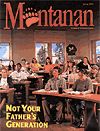
Spring 2000
CONTENTS
The Last Best Good Story
Not Your Father's Generation
Hooked On Teaching
Bucking Trends
Amazon Dreams
C'est Missoula Vie
AROUND THE OVAL
SPORTS
CLASS NOTES
ALUMNI NOTES
Contact Us
About the Montanan
PAST ISSUES
An Epiphany He calls that his epiphany. Since then he has directed his life toward gathering vital life skills, particularly agricultural knowledge. Among his projects since getting a master's degree in agriculture from Cornell University is the Program in Ecological Agriculture and Society (P.E.A.S.) that he founded with the help of UM Professor Bill Chaloupka and Associate Professor Deborah Slicer. P.E.A.S. is a course designed to study the social, political and economic side of the modern food system. Students can take the classroom course for one credit and/or grow food at the two-acre UM garden plot at Fort Missoula in a two-credit internship. And grow food, they have. Last year P.E.A.S. contributed 13,000 pounds of vegetables to the Missoula Food Bank, the largest donation of the year. The program also sells shares of the harvest to low-income families; in 1999 more than eighty families purchased shares on a sliding price scale determined by income. P.E.A.S. had appeared to be the victim of budget cuts last fall, but students organized and spread the word; soon it was clear there was a demand to keep the class going. UM offered it through Continuing Education and although student fees are much higher now, 60 students are in the class, 36 are in the internship and there's a long waiting list. Josh says students are drawn to the program because it offers a hands-on approach to problem solving and contributing to a better environment. "These kids have been hearing bad news since they were five or six years old," he says. "They have a strong desire to be involved in something tangible to make the world better." This time, Josh's skills have had very practical, measurable benefits.
A Tale of Two Chokers A UM senior majoring in English, Chris' two loves are creative writing and working with at-risk kids in the outdoors. When he heard of psychology Professor Paul Silverman's two-semester approach to studying intervention and prevention for at-risk youths with a focus on mentoring, Chris was ready to sign on. In the few months since then he has single-handedly developed a course for students at Rattlesnake Middle School that includes both an outdoor adventure series and a peer facilitation component. The outdoor adventure series has drawn students who meet once a week after school to learn skills such as canoeing, orienteering, kayaking and fire skills. Two students who have taken the outdoors course now help to teach others through the peer facilitator program. A resident adviser at UM, Chris also has enlisted four of his peers in the volunteer effort. But back to the choker. "My freshman and sophomore years in high school, I was a real underachiever," Chris says. Then he went on his first canoe trip with Les Voyageurs. It changed his whole perspective on the world. And he's wanted to help young people feel the same sort of empowerment since. He says the course "teaches outdoor skills as a kind of metaphor for life skills," noting one youth "may realize he's not good at paddling a canoe, but he is good at fire skills and cooking." And he is part of a whole. "They learn to put the group ahead of themselves," Chris says, adding, "It provides a break for them. They can break old habits and roles they had to play." And maybe, like Chris, they return a different person.
AROUND THE OVAL• SPORTS • CLASS NOTES • ALUMNI NOTES FEEDBACK•STAFF • ABOUT THE MONTANAN •ARCHIVES HOME • CONTENTS
|